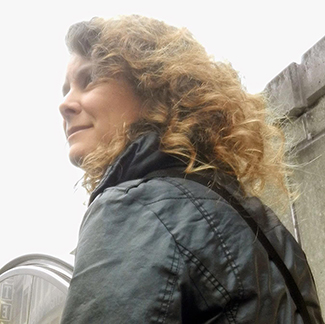
Kathleen Ralf
When it’s time for Kathleen Ralf’s class on Genocide and Human Rights to begin, her students log in from their homes all over the world. This semester, they were all able to take part in a common project through IWitness.
Ralf teaches in Germany at Frankfurt International School and with the Global Online Academy, an online school that offers a variety of courses for students around the world. Though they take place online, the courses are designed to be very interactive, including collaborative projects and Skype sessions with the instructor.
Ralf heard about IWitness through colleagues and decided to assign it to her online students this semester as part of their Holocaust unit. She asked them to come up with a question about the Holocaust and research it via testimony in IWitness. Each student constructed a short video with clips that offered an answer to their question.
“I saw IWitness as being a place where kids could really dig deep,” Ralf said.
She was surprised and impressed by the diversity of topics her students chose to research, including weddings in the ghettos, medical experiments in the camps, how faith helped people survive, communities before the war and returning home. Ralf required them to use at least three different survivors in their videos but most included five or six, she said.
IWitness introduces students to real people and stories they can relate to, Ralf said. For a teenager, it’s extremely impactful to hear a survivor say that what kept her alive was not wanting to let her parents down, for example. One student was moved by a survivor who said she was couldn’t plan anything more than two weeks ahead of time – she just had to live day by day. These are the kinds of stories that will resonate with students.
“Every kid was able to find a moment that really connected with them in a personal way,” she said.
Ralf’s family background – her husband’s father and grandfather were both German prisoners of war and his aunt was a secretary for the SS who notified wives that their husbands had been killed – and current events like the Syrian refugee crisis have shown her how important it is to continue studying the Holocaust and other genocides. Genocide is extremely complex and students often debate the tough choices people have to make in these situations – like when to stand up against intolerance.
“It’s about teaching tolerance to kids, and when you see acts of injustice, to speak up,” Ralf said. “Just to give them an open awareness of how easily we can slip into [a culture of intolerance]. Most of our kids have never lived through any sort of crisis where they had to make a life or death decision: do I stand up for this person and risk dying or act like I didn’t see it?”